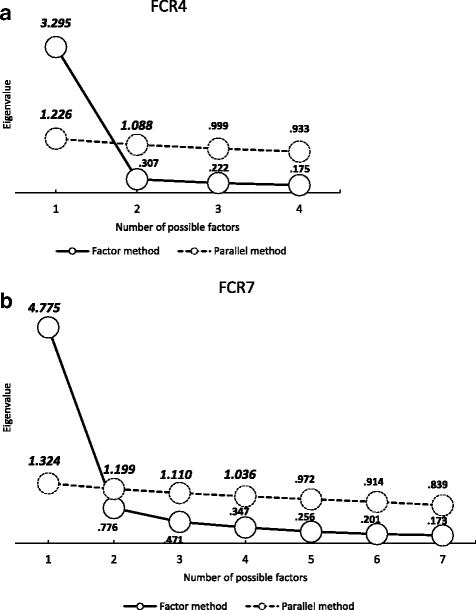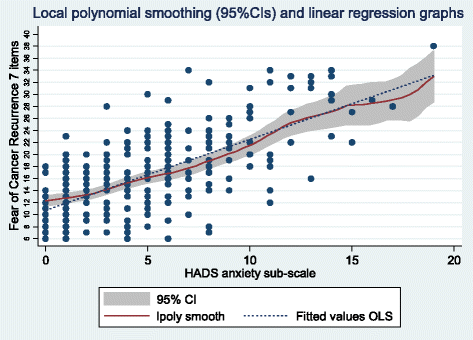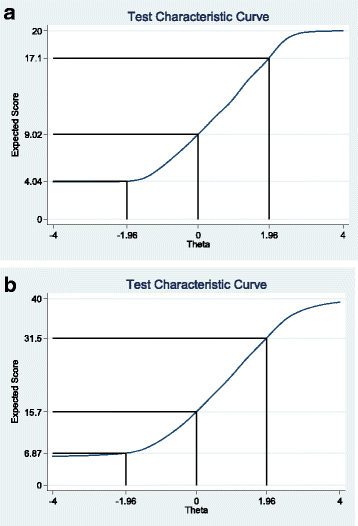Unidimensional scales for fears of cancer recurrence and their psychometric properties: the FCR4 and FCR7
- PMID: 29471823
- PMCID: PMC5822647
- DOI: 10.1186/s12955-018-0850-x
Unidimensional scales for fears of cancer recurrence and their psychometric properties: the FCR4 and FCR7
Abstract
Background: The assessment of fear of recurrence (FCR) is crucial for understanding an important psychological state in patients diagnosed and treated for cancer. The study aim was to determine psychometric details of a seven question self-report scale (FCR7) and a short form (FCR4) based upon items already used in various extensive measures of FCR.
Methods: Two consecutive samples of patients (breast and colorectal) were recruited from a single specialist cancer centre. The survey instrument contained the FCR7 items, Hospital Anxiety and Depression Scale (HADS), and demographic details. Clinical information was obtained from patient hospital records. Statistical analyses were performed using classical test and item response theory approaches, to demonstrate unidimensional factor structure and testing key parameters. Construct validity was inspected through nomological and theoretical prediction.
Results: Internal consistency was demonstrated by alpha coefficients (FCR4: 0.93 and FCR7: 0.92). Both scales (FCR7 & FCR4) were associated with the HADs subscales as predicted. Patients who experienced chemotherapy, minor aches/pains, thought avoidance of cancer and high cancer risk belief were more fearful. Detailed inspection of item responses profile provided some support for measurement properties of scales.
Conclusion: The internal consistency, and pattern of key associations and discriminability indices provided positive psychometric evidence for these scales. The brief measures of FCR may be considered for audit, screening or routine use in clinical service and research investigations.
Conflict of interest statement
Authors’ information
GH holds Honorary Consultant Clinical Psychologist contract at the Edinburgh Cancer Centre, Western General Hospital, Edinburgh. MS is supported by the Oxford NIHR CLAHRC.
Ethics approval and consent to participate
All patients were provided with a detailed Patient Information Sheet and given a minimum of 24 h from invitation to signing of a detailed consent form. The study was approved by NRES (07/S1103/27) and NHS Lothian R&D.
Consent for publication
Not applicable.
Competing interests
The authors declare that they have no competing interests.
Publisher’s Note
Springer Nature remains neutral with regard to jurisdictional claims in published maps and institutional affiliations.
Figures



References
-
- Simard S, Thewes B, Humphris G, Dixon M, Hayden C, Mireskandari S, et al. Fear of cancer recurrence in adult cancer survivors: a systematic review of quantitative studies. J Cancer Surviv. 2013;7:300–22. - PubMed
-
- Simonelli LE, Siegel SD, Duffy NM. Fear of cancer recurrence: a theoretical review and its relevance for clinical presentation and management. Psychooncology. 2017;26:1444-54. - PubMed
-
- Lebel S, Simard S, Harris C, Feldstain A, Beattie S, McCallum M, et al. Empirical validation of the English version of the fear of cancer recurrence inventory. Qual Life Res Int J Qual Life Asp Treat Care Rehab. 2016;25:311–321. - PubMed
Publication types
MeSH terms
LinkOut - more resources
Full Text Sources
Other Literature Sources
Medical

